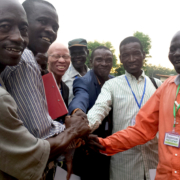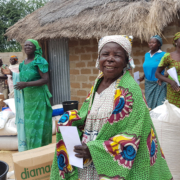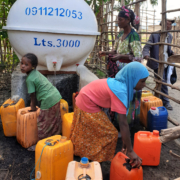For generations Muslims and Christians lived together in Boda, Central African Republic (CAR).
Muslims were mainly involved in dealing in diamonds found in the area. Christians worked as farmers and labourers in the diamond mines. The Muslims lived in their own part of town—a big Muslim quarter in the centre with two big mosques inviting them to prayer five times a day. The Christians lived all around the Muslim centre of Boda town.
Although there was sometimes intermarriage between the different groups, tensions were always present.
But in 2012 Muslim Seleka forces conquered almost the entire country. Some Muslims in Boda joined them. They attacked the Christian and Animist areas of town.
In 2014 Seleka was forced to retreat as international forces from France and the UN worked to restore order. But the local Muslims of Boda stayed behind.
Anti-Balaka, mostly Animist militias, but also included some Christians, were ready to pounce on the Muslims who had done them so much harm.
Aflame partners had built relationships with some of the pastors and Christians in Boda. We brought them food aid and other essentials in their camps. We also brought some training to help Christians deal with the hatred and bitterness.
Reconciliation Seminar
So in 2014 we organized a seminar on reconciliation. Only a small part of that seminar was about forgiveness, but it was this part that motivated Pierre and Jean to take a big step of faith. “During the seminar I decided to forgive the Muslims for what they had done to me and my family. Right here in the church, in front of all the other pastors, I bravely stated that I wanted to forgive and forget and to meet with our Muslim brothers,” Pastor Jean explains. Pierre decided to join him in his quest.
The next morning, they prayed together before ‘strolling into the enemy territory’. Some of the Muslim leaders saw the two pastors cross into their quarter.
“I must admit that I was scared. At least until we prayed. After we asked God to bless our offering of peace, I lost all my fear. Together with Pierre I walked towards the Muslim quarter, some five minutes down the road from my house.”
Jean: “Everybody knew you risked your life if you crossed that line without protection. People would shoot you on sight or they would arrest you and take you to their headquarters. But there we went. Slowly, calmly, in the middle of the road for everybody to see, Bibles in hands, we strolled towards the red line. Nothing happened. Everything was quiet. We crossed the red line. Nothing happened. We saw people stare, not knowing what to do. We continued walking.”
Then, in plain sight of everyone the pastors extended a hand to the Muslim elders and then they all continued to the end of the Muslim quarter together.
“We told them that we had forgiven them and that we loved them like before. We asked them to accept our offer of peace, which they did. Eagerly. It’s not that every Muslim was out there to kill Christians. We were friends before.”
Jean
Building peace through a marketplace
Not everybody was pleased, and the two pastors still had many hearts on both sides to convince. So, they encouraged people to buy and sell food in a small market they created on the border between the two areas. Slowly the peace started eroding hatred in people’s hearts.
“The Muslims had money but no food,” explains Pierre. “The Christians had farm products and firewood and other commodities but no money. So, we encouraged people to buy and sell food in a small market we started right on the ‘red line.’”
Slowly, the peace began to erode hatred in many people’s hearts.
Next the pastors created a platform for religious leaders: Catholics, Protestants and Muslims met and dialogued and gave advice on peace.
Together they convinced a big majority of the people who lived in and around Boda to reconcile completely.
The tranquillity between most of the Christians and Muslims in Boda is still rather uncommon in the Central African Republic. In fact, in many placed of the country this reconciliation has not happened, and the situation remains tense. But Boda is the proof that it is possible for Christians and Muslims to live side-by-side, even after all that happened.



